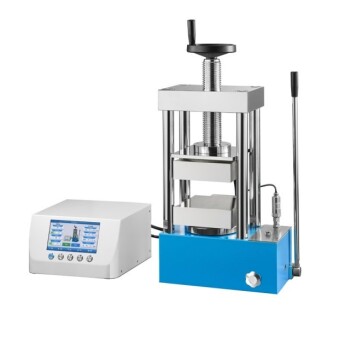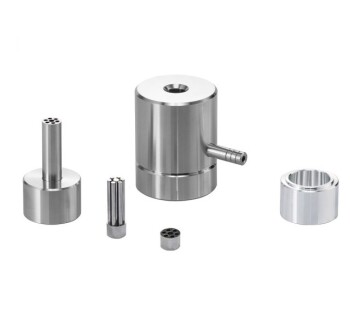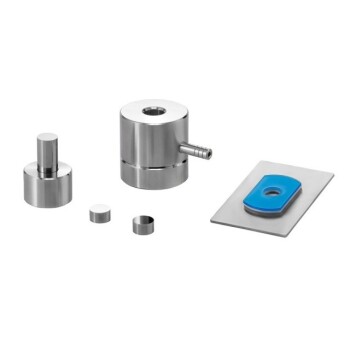To ensure the performance of a hot press machine, you must look beyond a single number and evaluate the interplay of three core technical systems. The key specifications are those that govern precise temperature control, the application of uniform and consistent pressure, and the sophistication of the control system that synchronizes these elements. High-quality components, such as imported temperature controllers and hydraulic valves, are indicators of reliability, but performance is ultimately defined by how well these systems work together to achieve a repeatable, accurate process.
A hot press machine's performance is not determined by its strongest specification, but by the precise and reliable integration of its heating, pressure, and control systems. A weakness in any one of these pillars will compromise the quality of the final product.

The Three Pillars of Hot Press Performance
A hot press functions by applying heat and pressure over a set time to bond, laminate, or mold materials. Its success depends entirely on how well it manages these three variables. We can break down the critical specifications into three categories: the Temperature System, the Pressure System, and the Control System.
Pillar 1: The Temperature System
The goal is to deliver the correct amount of heat uniformly and consistently across the entire workpiece.
Uniform and Rapid Heating
The platens—the heated plates that contact the workpiece—must heat evenly. Look for features like segmented heating systems or platens made from materials like titanium, which offer excellent thermal distribution.
Poor heat distribution creates weak spots in lamination or uneven curing. Pulse heating technology is another advanced feature that allows for very rapid temperature changes.
Precision and Stability
The machine must not only reach a target temperature but hold it steady. This is governed by the temperature controller and the system's sampling rate.
Specifications like 0.1s temperature sampling indicate a highly responsive system. The ability to program multi-stage temperature rises is also critical for processing sensitive materials that require a gradual heating profile to prevent thermal shock.
Pillar 2: The Pressure System
This system is responsible for generating and applying force. Its performance hinges on power, uniformity, and consistency.
The Hydraulic Core
Most high-performance presses use a hydraulic high-pressure system. The machine's structure, often a four-column, three-plate design, provides the rigidity needed to handle immense forces without flexing.
Ensure the machine's maximum pressure capacity is sufficient for your most demanding materials.
Consistency and Reliability
Pressure must remain constant throughout the press cycle. A feature like automatic pressure replenishment is critical, as it compensates for any minor pressure drops to ensure a consistent bond.
The quality of components is paramount here. Look for mentions of reputable brands for key parts, such as German Rexroth hydraulic valves or Italian pressure-keeping valves, as they are direct indicators of reliability.
Uniform Pressure Distribution
The force generated by the hydraulic system must be applied evenly across the platen surface. An adjustable pressure head and a rigid, well-engineered frame are crucial for eliminating air gaps and ensuring a flawless bond from edge to edge.
Pillar 3: The Control System
The control system is the brain that synchronizes heat, pressure, and time. Its sophistication directly impacts the quality and repeatability of your work.
The Brain of the Operation
Advanced electronic control systems allow an operator to precisely program and save recipes for different jobs. This ensures every parameter—temperature, pressure, and timing—is perfectly coordinated.
Look for a clear real-time temperature and pressure display, often via a digital gauge, which allows for in-process monitoring and quality control.
Repeatability and Accuracy
For any manufacturing process, consistency is key. A high-quality control system ensures that the 100th part produced is identical to the first. This is the foundation of quality assurance.
Essential features also include safety mechanisms like emergency stop switches and safety guards, which are integrated into the control logic.
Understanding the Trade-offs
Choosing a hot press involves balancing performance specifications against cost and specific application needs.
High-End Components vs. Budget
Premium components like titanium indenters and brand-name hydraulic valves offer superior precision and a longer service life. However, for less demanding applications, a machine with standard components may provide a perfectly acceptable return on investment.
Speed vs. Material Sensitivity
Features that enable short processing times, such as rapid heating and high pressure, are excellent for boosting throughput. However, some materials are prone to deformation or damage if not processed more slowly at lower temperatures and pressures.
Complexity vs. Usability
A control system with multi-stage programming and micro-adjustments provides ultimate control. This complexity can also mean a steeper learning curve for operators. Match the sophistication of the controls to the skill of your team and the demands of your products.
Matching Specifications to Your Application
Use your primary goal to focus your evaluation of a hot press spec sheet.
- If your primary focus is high-volume production: Prioritize specifications related to short cycle times, automation features like automatic pressure replenishment, and component reliability for maximum uptime.
- If your primary focus is absolute quality and precision: Scrutinize the control system's capabilities, temperature uniformity (segmented heating), and the precision of the pressure system.
- If your primary focus is material versatility: Look for a wide temperature and pressure range, along with the ability to program complex, multi-stage heating and pressure profiles.
By understanding how these core systems function together, you can confidently translate a list of technical specifications into a clear prediction of a machine's real-world performance.
Summary Table:
| System | Key Specifications | Importance |
|---|---|---|
| Temperature | Uniform heating, 0.1s sampling, multi-stage profiles | Ensures even heat distribution and prevents material damage |
| Pressure | Hydraulic high-pressure, automatic replenishment, uniform distribution | Applies consistent force for reliable bonding and lamination |
| Control | Advanced electronic systems, real-time display, safety features | Synchronizes heat, pressure, and time for repeatable results |
Ready to enhance your laboratory's efficiency with a reliable hot press machine? KINTEK specializes in lab press machines, including automatic lab presses, isostatic presses, and heated lab presses, designed to deliver precise temperature control, uniform pressure, and advanced automation for superior material processing. Whether you're focused on high-volume production, quality precision, or material versatility, our solutions ensure consistent performance and long-term reliability. Contact us today to discuss your needs and discover how KINTEK can support your laboratory's success!
Visual Guide

Related Products
- Automatic High Temperature Heated Hydraulic Press Machine with Heated Plates for Lab
- Heated Hydraulic Press Machine with Heated Plates for Vacuum Box Laboratory Hot Press
- Laboratory Manual Heated Hydraulic Press Machine with Hot Plates
- 24T 30T 60T Heated Hydraulic Lab Press Machine with Hot Plates for Laboratory
- Automatic Heated Hydraulic Press Machine with Hot Plates for Laboratory
People Also Ask
- Why is a heated hydraulic press essential for Cold Sintering Process (CSP)? Synchronize Pressure & Heat for Low-Temp Densification
- What is the core function of a heated hydraulic press? Achieve High-Density Solid-State Batteries
- Why is a heated hydraulic press considered a critical tool in research and production environments? Unlock Precision and Efficiency in Material Processing
- What industrial applications does a heated hydraulic press have beyond laboratories? Powering Manufacturing from Aerospace to Consumer Goods
- What role does a heated hydraulic press play in powder compaction? Achieve Precise Material Control for Labs



















